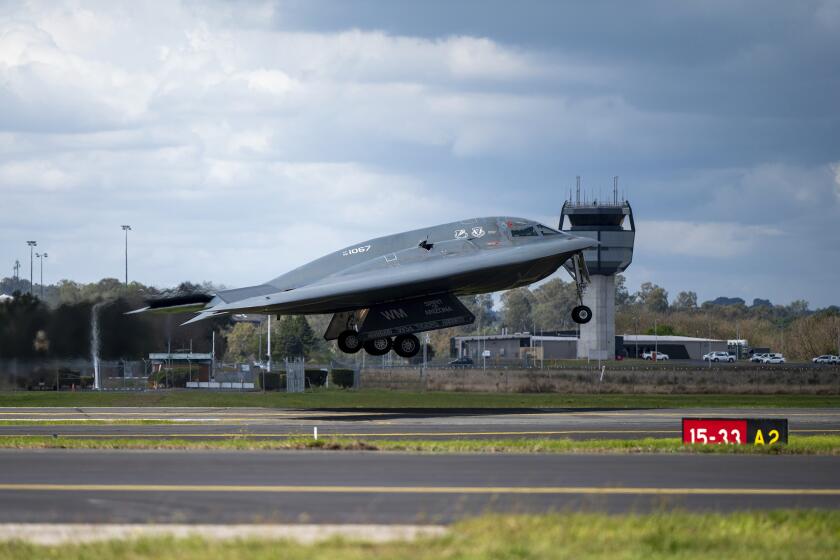Israel Drops 2-Tier College Tuition Plan
The Israeli Cabinet on Sunday approved a uniform university tuition rate of $1,200 for next year, superseding a Cabinet vote of six weeks earlier that would have established a controversial two-level system favoring armed forces veterans.
On another controversial issue, the Cabinet pursued its months-long debate over a multibillion-dollar fighter plane as thousands of aircraft workers whose jobs depend on its decision demonstrated outside. In the end, a decision on the aircraft project, considered pivotal to the country’s economy and its future defense strategy, was put off for at least another week.
The Cabinet’s earlier decision on university tuition had provoked an outcry both here and abroad because it was seen as discriminating against Israel’s Arab citizens. Most Israeli Arabs are deferred from army service for security reasons, while a vast majority of young Israeli Jews, including large numbers of women, face mandatory conscription immediately after completing high school. As a result, Arab university students would have had to pay tuition of $1,550 next year, while most Jewish students would have paid only $1,050 under the earlier formula.
Called Threat to Democracy
Education Minister Yitzhak Navon, who had called the earlier decision a “threat to democracy,” said he was satisfied with Sunday’s vote, even though it resulted in higher fees than he had recommended.
The government also approved a special $4.5-million budget supplement for the country’s universities to help make up for an expected drop in total tuition payments next year. But it did not come up with any longer-term solution to what officials describe as a financial crisis besetting Israel’s system of higher education.
Critics of the aircraft project warn that education will be only one of the areas facing further budget curbs unless the ministers decide to halt a seven-year-old program to build a sophisticated jet fighter for the next century.
To date, development of the controversial warplane, which is known as the Lavi (Lion) in Hebrew, has been funded almost entirely by U.S. military aid. But senior officials, including Defense Minister Yitzhak Rabin, say that with two prototypes already built, the program has reached a critical pre-production stage in which large additional infusions of cash either from Washington or out of the budgets of other government departments will soon be required.
American officials, who see the Lavi project as too large for the Israeli economy to bear without sagging under its weight, have said repeatedly that further aid increases are out of the question. They have proposed a number of alternatives, the most viable of which involve additional Israeli purchases of modified U.S. warplanes
Biggest Israeli Project
The Lavi is by far the largest industrial project in the history of the Israeli state. By some estimates, at its peak the project will by itself devour up to 5% of the entire annual value of goods and services produced in the country.
The Israeli army also advocates dropping the Lavi, arguing that it will increasingly gobble up such a huge proportion of the total defense budget that other vital programs will suffer or die.
Proponents of the Lavi say the project is worth making sacrifices for now because it will provide a high-technology stimulus to the Israeli economy that will pay off decades into the future, much as the space program has done in the United States.
Demonstrating in favor of the project Sunday were an estimated 5,000 employees of Israel Aircraft Industries, the prime contractor for the Lavi. They gathered outside Prime Minister Yitzhak Shamir’s office, where the Cabinet meeting was held, and shouted protests as known ministerial opponents of the program arrived. Later, a delegation of workers met with Shamir, who promised that no final decision would be made in the next few days.
Shamir, who is said to be a proponent of the Lavi, urged the workers to find ways to cut the project’s costs.
Intense Debate
A spokesman for the prime minister confirmed in an interview that the Lavi will be back on the Cabinet’s agenda next Sunday. However, he said the ministerial debate is “maybe the hardest we ever had,” with enormous consequences for the future of the country.
“Nothing will happen if it will take a month, or some weeks, to make a decision,” the spokesman commented.
Spokesmen for the worried aircraft workers predicted that 20,000 will be on hand to demonstrate in favor of the Lavi at next week’s Cabinet meeting.
“We have been working on the Lavi for the last seven years,” Shaul Etzion, spokesman for the contracting firm’s works committee, told Israel radio. “Three governments in effect have decided for the Lavi. . . . We don’t understand how a government, suddenly, decides different than previous governments.”
Etzion added that “maybe the United States is behind it,” and he also blamed other Israeli defense firms which, he said, hope to get more business if the Lavi is canceled and money is freed up for other military needs.
More to Read
Sign up for Essential California
The most important California stories and recommendations in your inbox every morning.
You may occasionally receive promotional content from the Los Angeles Times.









